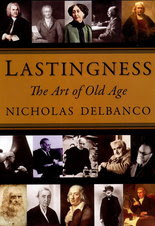 Lastingness, a word Nicholas Delblanco may have made up, is absolutely the subject of this not very long book. To state the obvious, it is about creativity going on into old age. Refreshingly Delblanco covers the various arts well and with many examples of people he has known. He writes of writers, of course, also painters and musicians, some recently deceased and some giants of yore like Goya, Bach, Tolstoy. Sometimes I felt a bit at sea as he seemed to have no direct line of inquiry - do brilliant people just keep getting better doing what they do? Do they grow in unexpected directions? Some are stopped by physical deterioration. Musicians can continue composing but lose the ability to play as they once did, he mentions Liszt and Casals and his own father-in-law, Bernard Greenhouse, an eminent cellist.
Lastingness, a word Nicholas Delblanco may have made up, is absolutely the subject of this not very long book. To state the obvious, it is about creativity going on into old age. Refreshingly Delblanco covers the various arts well and with many examples of people he has known. He writes of writers, of course, also painters and musicians, some recently deceased and some giants of yore like Goya, Bach, Tolstoy. Sometimes I felt a bit at sea as he seemed to have no direct line of inquiry - do brilliant people just keep getting better doing what they do? Do they grow in unexpected directions? Some are stopped by physical deterioration. Musicians can continue composing but lose the ability to play as they once did, he mentions Liszt and Casals and his own father-in-law, Bernard Greenhouse, an eminent cellist. Finally he reaches no overweening conclusion. Picasso's style changed constantly, Monet painted the same lily pond for the last 30 years of his life. If there is a final wrap up it's that individuals are all different. Guisseppi de Lampadusa who wrote The Leopard very, very late in life and never saw it in print although we now consider it one of the great works of literature said, about the time he started writing it, that he believes every aging adult should be required to write down his or her memories; that that is the only way history will remain known -- not the great history of politics but the history of ordinary people living ordinary lives.
Certainly many people do turn to writing memoirs, or at least recording their memories in some form. This week I am happy because a European woman in her 80s who was struggling to write her memoir that began just before WWII and recorded her experience as a young teen as a prisoner of war and then searching for her displaced family told me a publisher is interested in printing her work. I helped her edit it and put it into good English over several months of last year. It is a fascinating story that we Americans know nothing about. She is not a Jewish refugee -- they've told their stories -- her story is unique to me although not to central Europeans.
At her age, to have accomplished the telling -- and it is lengthy and wonderfully detailed -- was exciting, but to have it in book form and NOT self-published is a wonderful reward for her perseverance. That is lastingness as I am witnessing it. She was in a writing class I taught 18 months ago, others in my classes are also working on memoirs, all are senior citizens and many are fulfilling Lampadusa's instruction. They are recapturing years gone by that are unknown to their grandchildren's generation. Some will print their work, several will self-publish which is no disgrace any more. Lampadusa saw the world in the 1950s totally changed from the one he knew at the end of the 19th century as a young man, and my generation has even more change to deal with.
For those who don't recognize Lampadusa, you may remember the movie, The Leopard with Burt Lancaster as the nobleman -- that was, I think, in the '60s. A magnificent book, a great success only a few years after it's author's death, and a very fine movie.










3 comments:
June -- will try and find Leopard on Netflix. You'll have to share the title of the European woman's book when it gets published. Delblanco sounds like a cultural anthropologist. Nice post -- barbara
Delblanco is a novelist. He also writes essays on various subjects. I don't believe he has any background in cultural anthropology; if he had I think it would have been a deeper book. Thanks for the comment.
Delblanco is a novelist. He also writes essays on various subjects. I don't believe he has any background in cultural anthropology; if he had I think it would have been a deeper book. Thanks for the comment.
Post a Comment